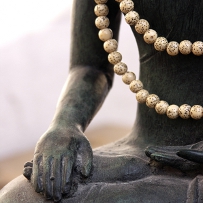|
|
|
|
|
 |

|

|

|
The greatest gift is the
gift of the teachings
|
|

|
| |
|
Retreat Dharma Talks
at Insight Meditation Society - Retreat Center
|
|
Three-Month Retreat - Part 2

|
| The annual three-month course, including its six-week partials, is a special time for practice. Because of its extended length and ongoing guidance, it is a rare opportunity for students to deepen the powers of concentration, wisdom and compassion. Based on the meditation instructions of Mahasi Sayadaw and supplemented by a range of skillful means, this retreat will encourage a balanced attitude of relaxation and alertness, and the continuity of practice based on the Four Foundations of Mindfulness. |
|
2008-11-01 (43 days)
Insight Meditation Society - Retreat Center
|
|
| |
|
2008-11-02
An Attitude Of Mindfulness
54:34
|
|
Guy Armstrong
|
|
|
The right attitude for meditation is one free of wanting, resistance or delusion. Then we can achieve the intelligent knowing of experience that mindfulness offers.
|
|
2008-11-09
Working With Difficult Emotions
60:55
|
|
Guy Armstrong
|
|
|
This talk describes the two shifts needed to transform our relationship to afflictive emotions, one of attitude and one of wisdom. We come to understand an emotion by learning to see its expression in mind, in body, and in the thoughts that make up its underlying view or story.
|
|
2008-11-13
Let The Breath Just Be The Breath
56:04
|
|
Sally Armstrong
|
|
|
The way we experience ourselves and the world is highly conditioned by our perceptions , known as sañña in the Buddhist teachings. Through the process of perception we judge and filter our experience, preventing us from seeing things as they really are. The practice of mindfulness offers the possibility of working directly with our perceptions, and even inclining the mind towards more skillful and pleasant ways of experiencing ourselves and the world.
|
|
2008-11-16
The Five Aggregates Are Not Self
60:42
|
|
Guy Armstrong
|
|
|
This talk looks at the question of not-self using the five aggregates as the Buddha spoke of them in his second discourse, the Characteristic of Not-Self. As we learn to see ourselves simply as an aspect of nature, both physical and mental, the burden of self lifts and life becomes much lighter.
|
|
2008-11-20
Dependent Origination: An Overview
57:49
|
|
Sally Armstrong
|
|
|
The Buddha considered Dependent Origination to be his most profound insight. This teaching shows us how we get caught in the cycle of suffering, and how it is possible to free ourselves. When we’re not aware of this process, we are blinded by our ignorance and get caught in craving again and again. We create different identities that we cling to, and that limit our ability to be free in the moment. When we’re aware of this process, we can make wiser choices about how to respond, and perhaps even break the cycles of becoming altogether. This talk gives a brief overview of the 12 links of Dependent Origination, and then describes how it works on a practical, moment-to-moment basis in our lives.
|
|
|
|
|
|
|
|
|